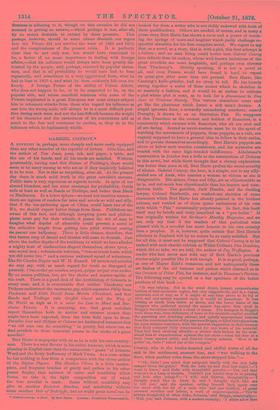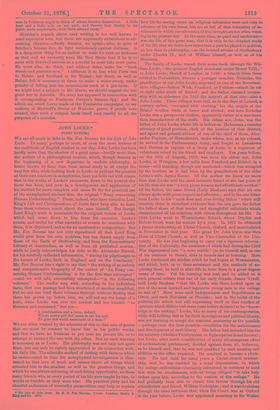GABRIEL CONROY.*
A NOVELIST is, perhaps, more cheaply and more easily equipped than any other member of the republic of letters. Give him, said the author of Tom Jones, pens, ink, and paper, a table, and the use of his hands, and all his needs are satisfied. Without, presumably, having read this dictum of Fielding's, there would seem to be many among us who act as if they implicitly believed it to be true. Nor is this so surprising, after all. At the present clay there is much solid truth in the great novelist's sarcasm. Public taste is very capricious as regards novels. In spite of her absurd blunders, and her utter contempt for probability, Ouida sells at least as well as Reade or Trollope, and better than Black or Blackmore. In a lower sphere—we need not mention names— there are legions of readers for tales and novels so wild and silly, that if the tea-gathering apes of China could learn two of the R's, we should expect better things from them. Publishers are aware of this fact, and although incepting poets and philoso- phers must pay for their whistle, it passes the wit of man to imagine what depths of absurdity could prevent a novel of the orthodox length from getting into print without costing its parent one halfpenny. There is little chance, therefore, that this barren crop of darnel and thistles will cease to flourish. Just above the nether depths of the residuum to which we have alluded a mighty host of mediocrities disport themselves, clever tyros,- 'one-novel men ; voluminous veterans, "true as truest horse which yet did never tire ;" and a curious awkward squad of volunteers, Lb Sir Charles Napier and W. H. Russell. Of novels and novelist we may say, with as much regard for truth as disregard of prosody, Gras scribe: qui nondum scripsit, quique scripsit eras sari bet. By no means guiltless, too, are the choice and master-spirits of the craft. There is a good deal of the Archbishop of Granada in every man, and it is conceivable that neither Thackeray nor Dickens understood the enormous gap which separates Philip from Pendennis and Little Dorrit from Martin Chuzzlewit, and that Resde and Trollope rate Griffith Gaunt and the Way of the World as high as it is never too Late to Mend and Bar- eliester Towers. It is annoying, too, that great novelists repeat themselves both in matter and manner sooner than might have been expected, from the wide field open to them. Paradise Lost and CEdipus at Colonus are hackneyed instances that 4 an old man can do something" in poetry, but where can we find parallels to those immortal poems in the works of a great alovelist ?
Bret Harte is as popular with us as he is with his own country-
men. There is a racy flavour in his native humour, which is more pleasing to English taste than the manneristic " goaks "of Artemus Ward and the lively buffoonery of Mark Twain. As a verse-writer lie has nothing to fear from a comparison with the clever author of the Biglow Papers. His Heathen Chinee is a little master- piece, and frequent touches of gaiety and pathos in his other poems display that mixture of sense and sensibility which forms, we take it, the right composition out of which the true novelist is made. Sense without sensibility may give us another Roderick Random, and sensibility without sense another Heir of Redclyffe, but no really great novel can be • Gabriel conroy : a Novel. By Bret Harts. London: Frederick Warne and Co.
looked for from a writer who is not richly endowed with both of these qualifications. Others are needed, of course, and in many a
prose story Bret Harte has shown a verve and a power of touch- ing the springs of tears and laughter which justly challenge re- spectful attention for his first complete novel We regret to say that as a novel, as a story, that is, with a plot, this first attempt is a failure ; and no man living could better turn Gabriel Conroy
into ridicule than its author, whose well-known imitations of the great novelists are more laughable, and perhaps even cleverer than Thackeray's. Strictly speaking, it is not a novel at all, and even Porson would have found it hard to repeat its quasi-plot after more than one perusal. Bret Harte, like Canning's knife-grinder, had no story to tell. He has loosely strung together a series of those scenes which he sketches in
so masterly a fashion, and it would be as useless to criticise a plot where plot is none, as to look for a denouement in Don Juan or Tristram Shandy. The various characters come and go like the phantoms which haunt a sick man's dreams. A stupid ignorant boor, a cowardly maundering murderer, named Dumphy, is shown to us on Starvation Flat. He reappears at San Francisco as the coolest and boldest of financiers, in a community which swarms with financiers, who all are cool and all are daring. Inured as novel-readers must be to the sport of watching the movements of puppets, these puppets, as a rule, are vaguely supposed to have a general idea to follow in their antics, and to govern themselves accordingly. Bret Harte's puppets are above or below such wooden consistency, and his mysteries are treated with the same high-handed indifference. Athelstane's resurrection in Ivanhoe was a trifle to the resurrection of Dolores in this novel, but while Scott thought that a clumsy explanation was better than none at all, Bret Harte prefers the sweet security of silence. Gabriel Conroy, the hero, is a simple, not to say silly- sonled son of Anak, who marries a woman as vicious as she is disagreeable. His sisters, Grace and Oily, are as objectionable as he is, and not much less objectionable than his impure and men-
dacious bride. The gambler, Jack Hamlin, and the duelling lawyer, Colonel Storbottle, are washed-out sketches of some characters which Bret Harte has already painted in the liveliest colours, and remind us of those queer caricatures of his own
style which " Phiz " occasionally perpetrates. In fact, this book itself may be briefly and truly described as a "pot-boiler." It was originally written for Scribner's Monthly Magazine, and we can only say that if the readers of that periodical were pleased with it, a novelist has more honour in his own country than a prophet. It is, however, quite certain that Bret Harte's admirers in England will by no means be so easily satisfied. But for all this, it must not be supposed that Gabriel Conroy is to be ranked with such chaotic rubbish as Wilkie Collins's Two Destinies, which did so take, we are told, the author of Peg 1Voffington. A
reader who had never met with any of Bret Harte's previous stories might possibly like it well enough. It is as good, perhaps,
as any of Mayne Reid's romances, and not nnfrequently there are flashes of the old humour and pathos which charmed us in the Outcasts of Poker Flat, for instance, and in Tennessee's Partner.
The following may be quoted as a fair specimen of the better portions of this book :—
"It was raining. Not in the usual direct, honest, perpendioular fashion of that mountain region, but only suggestively, and in a vague, uncertain sort of way, as if it might at any time prove to be fog or mist, and any money wagered upon it would be hazardous. It was raining as much from below as above, and the lower limbs of the loungers who gathered around the square box-stove that stood in Briggs's warehouse exhaled a cloud of steam. The loungers in Briggs's were those who, from deficiency of taste or the requisite capital, avoided the gambling and drinking saloons, and quietly appropriated biscuits from the convenientbarrel of the generous Briggs, or filled their pipes from his open tobacco-canisters, with the general suggestion in their manner that their company hilly compensated for any waste of his material. They had been smoking silently—a silence only broken by the occa- sional hiss of expectoration against the hot stove—when the door of a back room opened softly, and Gabriel -Conroy entered. 'How is he gettin' on, Gabel" asked one of the loungers."
Conroy, who is the tender-hearted and skilful nurse of all the
sick in the settlement, answers him, and "was walking to the door, when another voice from the stove stopped him :"— " 'Oh, Gabe! you mind that emigrant family with the sick baby camped down the gulch ! Well, the baby up and died last night.'—' I want to know,' said Gabe with thoughtful gravity.—' Yes, and that woman's in a heap of trouble. Couldn't you kinder drop in in passing and look after things?'— 'I will,' said Gabriel, thoughtfully.—'I thought you'd like to know it, and I thought she'd like me to tell you,' said the speaker, setting himself back again over the stove with the air of a man who had just fulfilled, at great personal sacrifice and labour, a work of supererogation.—' You're always thoughtful of other folks, Johnson,' said Briggs admiringly.— 'Well, yes,' said Johnson, with a modest serenity; I tllers allow that men in Californy ought to tbink of others besides themselves. A little keer and a little sube on my part, and there's that family in the gulch made comfortable, with Gabe around them."
Sheridan's remark about easy writing is too well known to need repetition here, but there are apparently subscribers to cir- culating libraries—chiefly females, we opine—who, in spite of Schiller's famous line, do fight victoriously against dullness. It is a dangerous thing for an author to write for such an audience 313 that, and we earnestly warn Mr. Bret Harte that if he is to meet with deserved success as a novelist he must take more pains. He must also, we think, and without delay, make for "fresh woods and pastures new." California is to him what Paris was to Balzac, and Scotland to Sir Walter ; but Scott, as well as Balzac, felt it necessary at times to make a wider sweep, under penalty of falling into the monotonous track of a gin-horse. If we might hint a subject to Mr. Harte, we should suggest the last great war in America. No story has appeared in connection with it corresponding to Fenimore Cooper's famous Spy ; and the adroit use which Lever made of the Peninsular campaigns, to say nothing of Maxwell's Stories of Waterloo, prove, if proofs were needed, that such a subject lends itself very readily to all the purposes of a novelist.



































 Previous page
Previous page